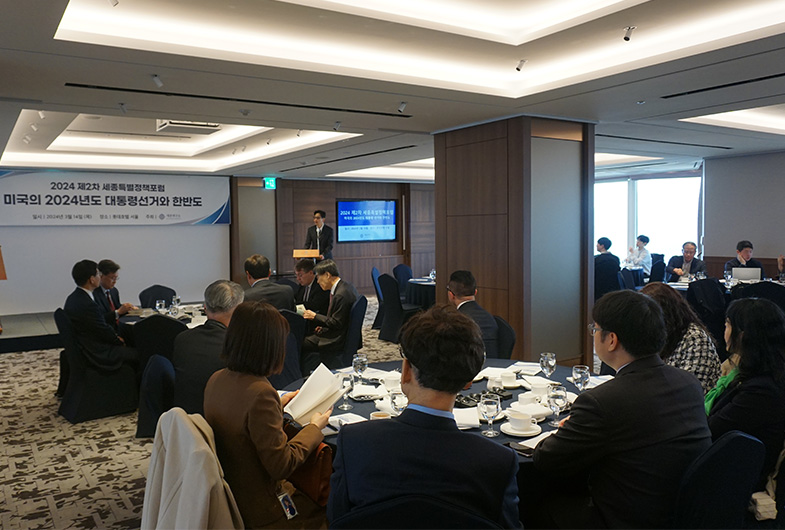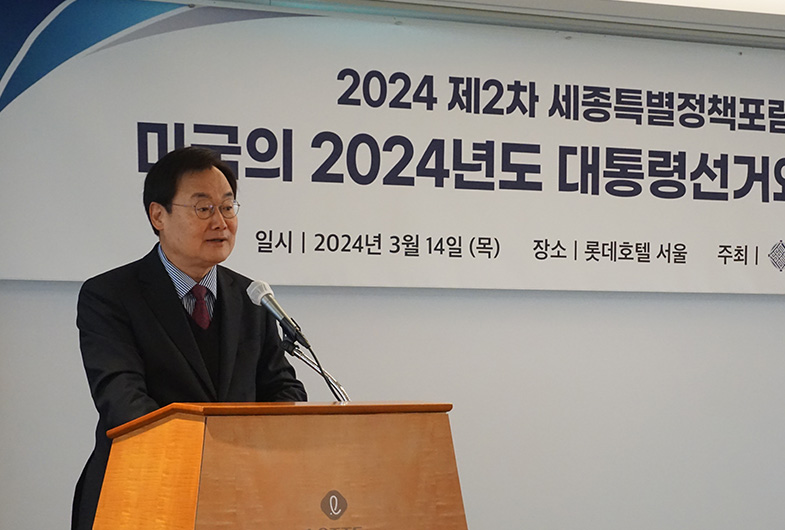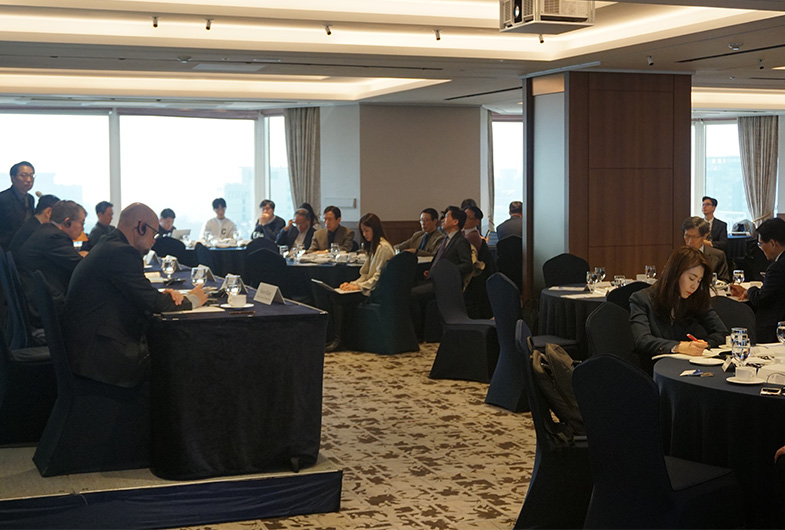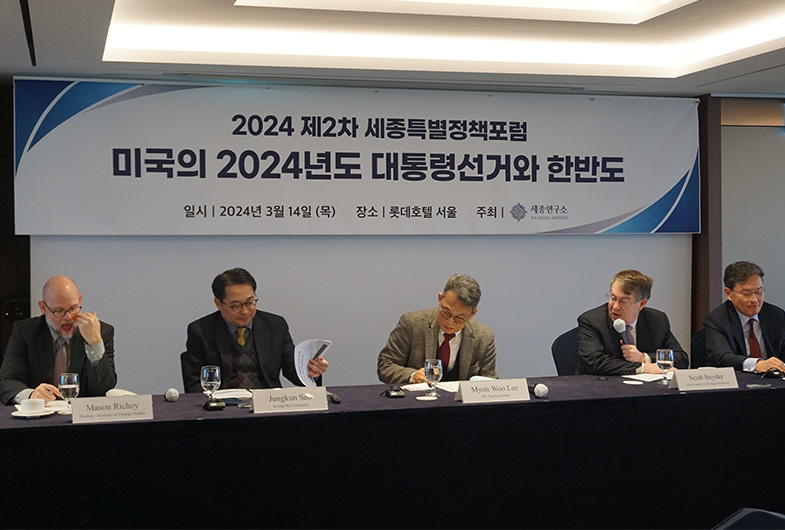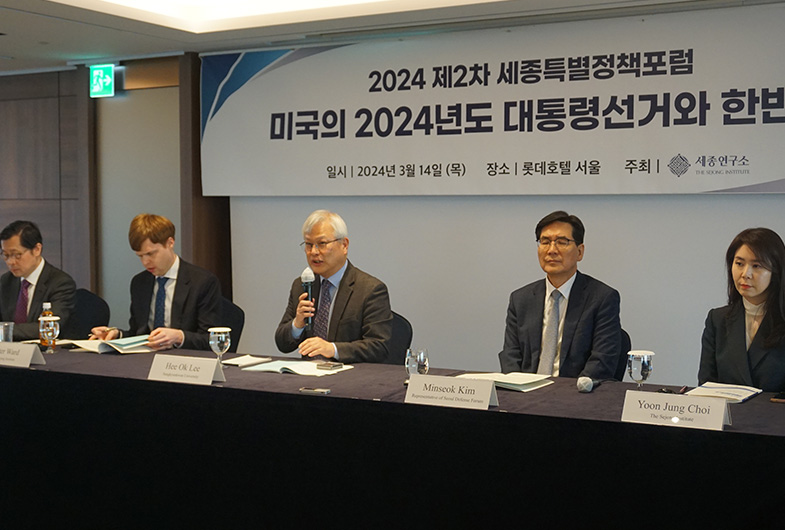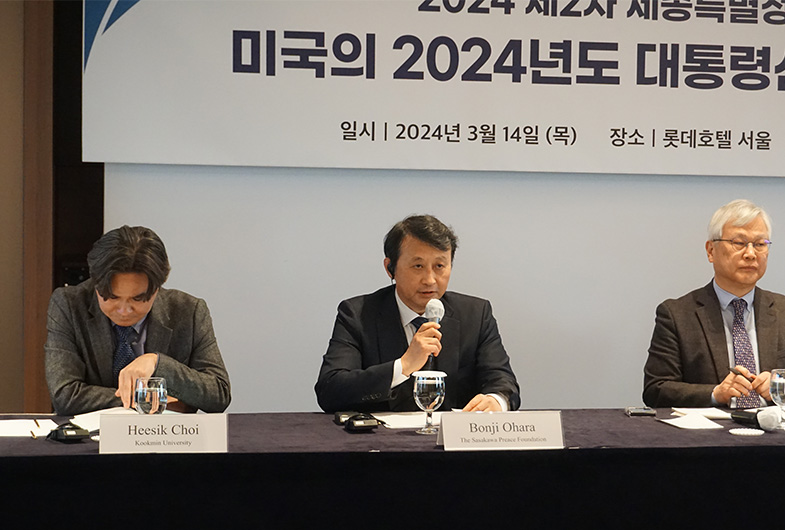The Sejong Institute held the 2nd Sejong Special Policy Forum on "The U.S. Presidential Election and Its Impacts on the Korean Peninsula" at Lotte Hotel on Thursday, March 14.
The forum was organized with the aim of diagnosing the policy of various countries surrounding the Korean Peninsula and assessing the ultimate response of the Korean government by inviting prominent domestic and international experts on how the 2024 U.S. presidential election in November will affect the future situation on the Korean Peninsula.
After the opening remarks by Amb. Yong Joon Lee, Chairman of the Sejong Institute, the 1st session of the forum was moderated by Dr. Myon Woo Lee, Vice President of the Sejong Institute and 2nd session was moderated by Hee Ok Lee, professor of Sungkyunkwan University.
In the first session, Professor Jungkun Seo from Kyung Hee University analyzed the "2024 U.S. Presidential Election and Foreign Policy Prospects" by looking at various election data for each scenario in which Trump and Biden could gain an advantage in the U.S. presidential election. In particular, he predicts how Trump's judicial risk and the ongoing War in Ukraine could affect the dynamics of the US presidential election.
The second speaker, Scott Snyder, Senior Fellow of the Council on Foreign Relations, discussed "The U.S. Presidential Election and Changes in U.S. Foreign Policy" from the perspective of 1) the evolution of U.S. voters' views on the U.S. role as a global leader; 2) the competing political rhetoric between Trump and Biden; 3) the outcome of the 2024 U.S. presidential election and North Korea policy; 4) the outcome of the U.S. presidential election and changes in global trade policy; and 5) the 'threat from within' against 'America First Idea' and its implications for U.S.-ROK alliance management.
He argued that the pursuit of American identity, which has resurfaced in Washington following the U.S. presidential election, is not incompatible with the U.S.-South Korea alliance and security cooperation, and that a strong alliance can continue to be the cornerstone of a mutually beneficial relationship in the future, given the recent increase in South Korean companies investing in the United States.
Afterward, Professor Mason Richey from Hankuk University of Foreign Studies and Vice President Kim Young-ho from Korea National Defense University commented on each speaker's presentation.
In the second session, Kim Min-seok from the Seoul Defense Forum presented "Changes in U.S. Foreign Policy and Relations with Major Countries: Focusing on the Trump Administration 2.0." He comprehensively reviewed the U.S.-ROK relations, U.S.-North Korea summit diplomacy, and national security strategy during the first term of the Trump administration. He also reviewed the concerns and prospects anticipated through the Trump re-election project; the "Mandate for Leadership" report, and discussed realistic options for the South Korean government's desirable responses in areas such as North Korea nuclear negotiations, U.S.-ROK military, and cost-sharing deal.
The second speaker, Dr. Peter Ward, a Research Fellow at the Sejong Institute presented "The Next US Presidential Election: Focusing on North Korea's Response," and examined the current Biden administration's foreign policy and its implications for the Korean Peninsula, focusing on Kim Jong Un's assessment of the Biden administration as revealed in North Korea's official statements. Based on this, he explained the possible reactions under various scenarios in the event of a Biden or Trump victory in the 2024 U.S. presidential election, using the geopolitical factors surrounding the Korean Peninsula.
Bonji Ohara, Senior Fellow from Sasakawa Peace Foundation presented "Changes in U.S. Foreign Policy and Japan's Response," first discussed the geopolitical implications of the U.S. extended deterrence policy and then outlined the positions of Russia, China, and North Korea in the context of the 2024 U.S. presidential election. Based on this, he then presented the domestic and international challenges related to how South Korea and Japan, as key alliance partners in the U.S. pivot to the Asia-Pacific region, should jointly and individually respond to the outcome of the U.S. election.
Finally, Jiang Longfan, a China Fellow at the Sejong Institute presented "Expected Reactions and Responses from China,", and analyzed the public policies of the Trump administration since the inauguration of the first Trump administration through the framework of the Economic Prosperity Network and the Indo-Pacific Economic Framework(IPEF), and examine U.S.'s consistent efforts to exclude China from global supply chains. Based on this, he predicted that the 2024 U.S. presidential election is ultimately unlikely to bring about a significant change in the current neo-Cold War structure of the U.S.-China strategic competition, and points out conflict management factors that should be considered to reduce the global security risks of the U.S. presidential election outcome.
Dr. Yoon Jung Choi(Director of the Center for Diplomatic Strategy of the Sejong Institute), Dr. Seong Chang Cheong(Director of the Center for Korean Peninsula Strategy of the Sejong Institute), Professor Hee Sik Choi (Professor of Kookmin University), and Dongryul Lee(Professor of Dongdeok Women's University) made comments on 2nd session's presentation.
